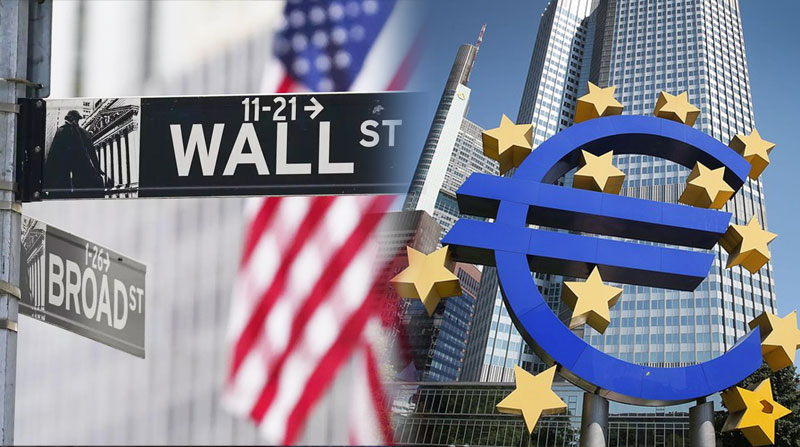WALL STREET RALLIED WHERAS EUROPE MARKET REPORTED MIX

Wall Street rallied after a muted start on Friday, with the Dow adding more than 700 points and both the S&P 500 and Nasdaq up around 2.4% as investors reassessed the outlook for monetary policy. The trigger for the abrupt upside move was a report from the WSJ that showed that some officials are signaling a desire to slow down the pace of the increase soon to gauge the impact of such tightening on growth. The market movement came in tandem with easing Treasury yields, which brought some respite to growth-oriented stocks. Still, volatility showed no signs of abating amid Friday’s $2 trillion options expiration. Meanwhile, a slew of negative quarterly results from corporate America capped gains. Snap crashed 28% after the company forecasted zero growth for the current quarter, triggering a selloff among other social media companies dependent on advertising revenue. All major US indices closed in the green for the week with the Dow gaining 4.9%, the S&P 4.7%, and the Nasdaq 5.8%.
European equity markets closed mostly lower on Friday, with the benchmark Stoxx 600 down more than 0.5% and the German DAX also below the flatline led by declines in real estate companies. On the corporate front, Adidas tumbled 8% after cutting its full-year outlook, while Deutsche Bank was slightly down as it laid off dozens of origination and advisory staffers within its investment banking unit in an attempt to limit costs. Meanwhile, Renault's Q3 sales were in line with analyst expectations, media company Vivendi reported an uptick in quarterly revenue and eyewear group Essilor Luxottica said Q3 revenue rose on a sale rebound. For the week the domestic DAX more than 2%.
The FTSE 100 rose 0.4% to 6,970 on Friday, extending a 0.3% gain in the previous session and outperforming its European peers, boosted by gains in basic materials, energy and healthcare companies while a weaker pound supported export-oriented companies. Glencore led gains, up more than 3%, followed by Anglo American and Antofagasta, both gaining over 2%. On the other hand, retailers were under pressure after data showed retail sales in the UK dropped a much-bigger-than-expected 1.4 percent month-over-month in September of 2022, with rising prices and the cost of living weighing on consumer spending. Auto Trader Group and JD Sports were the biggest laggards on the index, down nearly 6% each. The FTSE 100 advanced about 1.5% on the week, as investors digested Liz Truss's resignation as PM following a failed tax-cutting budget that triggered a selloff in the gilts market and the British pound, leading to a revolt within her own Conservative Party.
The CAC 40 index closed 0.9% lower at 6,035 on Friday, tracking the broad decline of European equities with pressure from monetary tightening woes, political uncertainty, and poor corporate results. The heavy-weighing consumer discretionary sector in Paris was among the sharpest losers, with L’Oreal shares tanking nearly 6% after the group said that higher inflation is could hurt its sales. Kering sank more than 3% amid profitability concerns, as the economic outlook for major consumer China continues to darken and sales for Gucci underperformed. Also, Renault shares fell over 2% after reporting a 2.5% dip in third quarter sales, hampered by a persistent shortage of semiconductors. In the meantime, President Macron announced that France has withdrawn from the Energy Charter Treaty. Still, the CAC 40 closed the week 1.8% higher.
The FTSE MIB index closed 0.6% lower at 21,570 on Friday, partially rebounding from being down 2% in the session after reports stated that Fed policymakers are starting to consider more risks of the overtightening of monetary policy. Still, recession fears and uncertainty regarding energy supply drove European equities to underperform those in the US, as EU leaders met in Brussels and reconsidered a price cap on energy. Utility shares dropped over 1% on average. On the political front, Giorgia Meloni was set to be sworn in as the country’s new Prime Minister by the Italian President Mattarella shortly before the closing bell. Political uncertainty jitters in Italy emerged recently as the expected PM said her coalition would not continue should other party leaders disagree with her pro-EU and pro-NATO stance. On the week, the FTSE MIB index gained 3%.
The IBEX 35 lost 1.4% to 7,537 on Friday, down from a 0.8% gain in the previous session, led by an over 5% decline in Grifols after the pharma group said about 54,000 donors in Illinois had filed a lawsuit claiming the company breached data protection regulations. Still, the company said its legal team recommended not to make a provision for the outcome of the lawsuit as potential liabilities associated with the case were insured, and it said it believed it had arguments backing its position. Meanwhile, Ferrovial lost more than 4% and the heavyweight Inditex group dropped by over 3%. Market sentiment was clouded by concerns over the economic outlook, stubbornly high inflation, the prospect of higher interest rates and political uncertainty in the UK. Still, the IBEX 35 advanced 2.3% this week.


